Can thyroid patient get pregnant and still have a healthy baby, ensuring the baby's health ? The short answer is yes—and it’s more common than you think, especially when thyroid levels are properly managed.
According to the American Thyroid Association, thyroid disease affects nearly 1 in 8 women during their lifetime, and untreated problems can raise risks like miscarriage, low birth weight, or fertility struggles when trying to conceive.
Understanding the connection between thyroid health and pregnancy outcomes is crucial, as managing this connection can improve fertility, support ovulation, and help ensure a healthy pregnancy while maintaining a healthy weight.
But here’s the good news: with early diagnosis, proper thyroid hormone replacement, and regular blood tests, most women go on to have a healthy pregnancy and baby.
If you’re worried about your thyroid, you’re not alone—and you absolutely can take steps today to protect both your reproductive health and your baby’s future.
Can Women with Thyroid Problems Have Pregnancy Chances? Expert Insights

Yes, can thyroid patient get pregnant and still have a healthy baby? The answer is often yes—with the right care, even for those with irregular cycles.
Thyroid disease is common. The thyroid is a small gland in your neck, but it has a big role in pregnancy. Many of them still go on to have a successful pregnancy. What matters most is early diagnosis, treatment, and close monitoring of thyroid hormone levels.
Doctors check your thyroid gland through simple blood tests. These tests look at thyroid stimulating hormone (TSH) and other hormone levels. If there are thyroid problems, your healthcare provider can adjust treatment.
With support, women with thyroid conditions can still enjoy a healthy pregnancy and even reduce miscarriage risk.
Why thyroid health matters for reproductive health
Your thyroid produces hormones that control metabolism, energy, and growth. Thyroid hormones influence the entire reproductive system, from menstrual cycles to conception. These same hormones play a big role in fertility and pregnancy.
If you don’t have enough thyroid hormones (underactive thyroid) or too much thyroid hormone (overactive thyroid), it can affect your menstrual cycle, increase the risk of preterm birth, and make it harder to get pregnant.
Thyroid disorders often lead to fertility difficulties, especially for those experiencing difficulty conceiving but treatment improves the chances of natural conception.
Here’s why keeping thyroid health in balance is important:
- Fertility: Thyroid disorders can affect ovulation and reproductive health. Your body needs enough hormones to support ovulation and prepare for pregnancy.
- Pregnancy Risks: Untreated hypothyroidism affect pregnancy outcomes, like low birth weight or birth defects.
- Baby’s Development: This butterfly-shaped gland controls how your body uses energy and supports pregnancy. Enough thyroid hormones support the baby’s thyroid gland and nervous system growth.
- Safer Outcomes: Maternal fetal medicine experts confirm that with treatment—like thyroid hormone replacement—women with thyroid conditions can still get pregnant and deliver a healthy baby.
“When thyroid problems are properly treated, most women with thyroid conditions have the same chance of a healthy pregnancy as women without them,” notes the American Thyroid Association.
Proper management of thyroid conditions is the way to achieving successful conception and a healthy pregnancy, even if you have thyroid related fertility issues.
Understanding Thyroid Conditions and How They Affect Fertility Problems
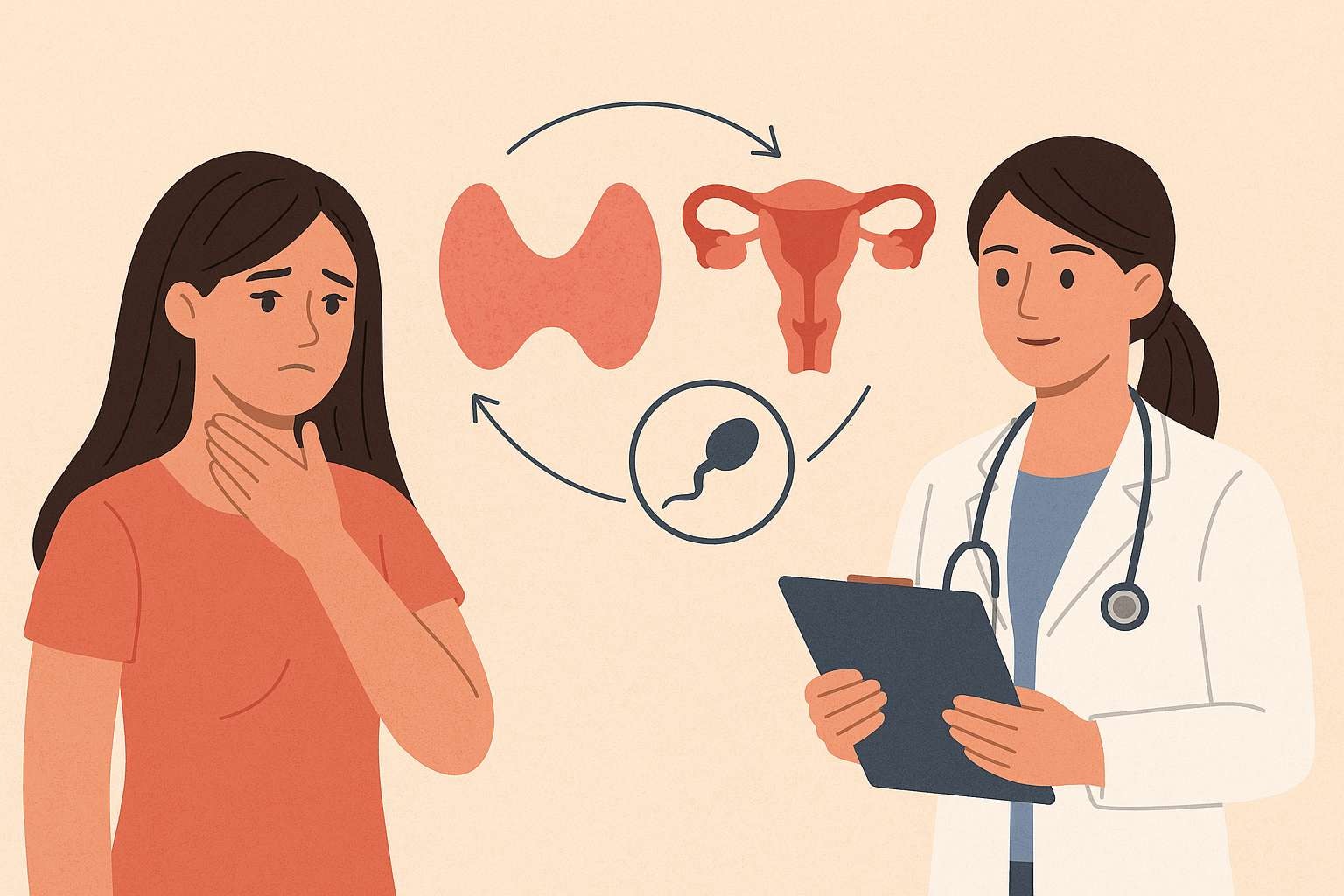
There are various ways to detect, prevent, and manage thyroid conditions to support fertility and pregnancy. For many women, thyroid treatment becomes an important part of their fertility journey.
1. Underactive Thyroid (Hypothyroidism)
An underactive thyroid means the gland is not making enough thyroid hormones. Doctors call this hypothyroidism.
How it affects fertility:
- It can disturb the menstrual cycle, making it harder to track ovulation.
- Not enough thyroid hormones may cause irregular periods and affect fertility.
- During pregnancy, untreated hypothyroidism affect the baby’s growth, leading to risks like low birth weight or developmental delays in the nervous system.
What to do:
- Doctors usually prescribe thyroid hormone replacement (like levothyroxine).
- Simple blood tests help check thyroid hormone levels and thyroid stimulating hormone (TSH).
- With proper treatment, women with thyroid conditions can still get pregnant and have a successful pregnancy.
2. Overactive Thyroid (Hyperthyroidism)
An overactive thyroid makes too much thyroid hormone. Doctors call this hyperthyroidism.
How it affects fertility:
- It can shorten or stop your periods.
- It may increase the risk of miscarriage if left untreated.
- In some cases, the baby’s thyroid may be affected too.
What to do:
- Doctors may prescribe PTU (propylthiouracil), which is often the preferred antithyroid medication during the first trimester of pregnancy due to its safety profile.
- Women should avoid unsafe options like radioactive iodine during pregnancy.
- Regular check-ups with a maternal fetal medicine expert help protect both mother and baby.
3. Autoimmune Thyroid Disorders
An autoimmune thyroid disorder happens when the immune system mistakenly attacks the thyroid cells. The two most common conditions are Graves’ disease and Hashimoto’s disease.
How it affects fertility:
- The attack on the thyroid gland changes thyroid hormone levels, making them too high or too low.
- Women with thyroid problems like these may have irregular menstrual cycles, which affect fertility.
- Untreated hypothyroidism or hyperthyroidism can raise miscarriage risk and even cause birth defects in some cases.
- Certain antibodies, such as TRAb, can cross the placenta and impact the baby's thyroid function during pregnancy.
What to do:
- Doctors may check your thyroid with blood tests and recommend medicine to balance hormone levels.
- Sometimes, thyroid hormone replacement is needed.
- According to the American Thyroid Association, “treating thyroid disease early improves fertility and supports a successful pregnancy.”
4. Enlarged Thyroid or Goiter
A goiter means the thyroid gland is bigger than normal. It can happen because of iodine deficiency, autoimmune disease, or other thyroid issues.
How it affects fertility:
- An enlarged thyroid may signal thyroid dysfunction such as hypothyroidism or hyperthyroidism.
- These conditions can lower the chances of getting pregnant and increase risks like low birth weight in babies.
- In some cases, goiter may also cause swallowing problems or cosmetic concerns.
What to do:
- A simple physical exam of the neck can help doctors detect goiter, thyroid nodules, or swelling early.
- Your healthcare provider may suggest thyroid surgery or medication depending on size and symptoms.
- Regular monitoring of hormone levels helps ensure normal thyroid function.
- Safe treatment before pregnancy gives you better chances for a healthy pregnancy and a healthy baby.
Quick fact: WHO data shows goiter affects millions worldwide, especially in areas with low iodine intake. But with early treatment, women with thyroid conditions can still get pregnant successfully.
Women with thyroid disease may also face changes in fertility or menopause symptoms earlier than expected. In men, thyroid disorders may also reduce sperm count and affect conception chances.
Thyroid Hormones and the Menstrual Cycle
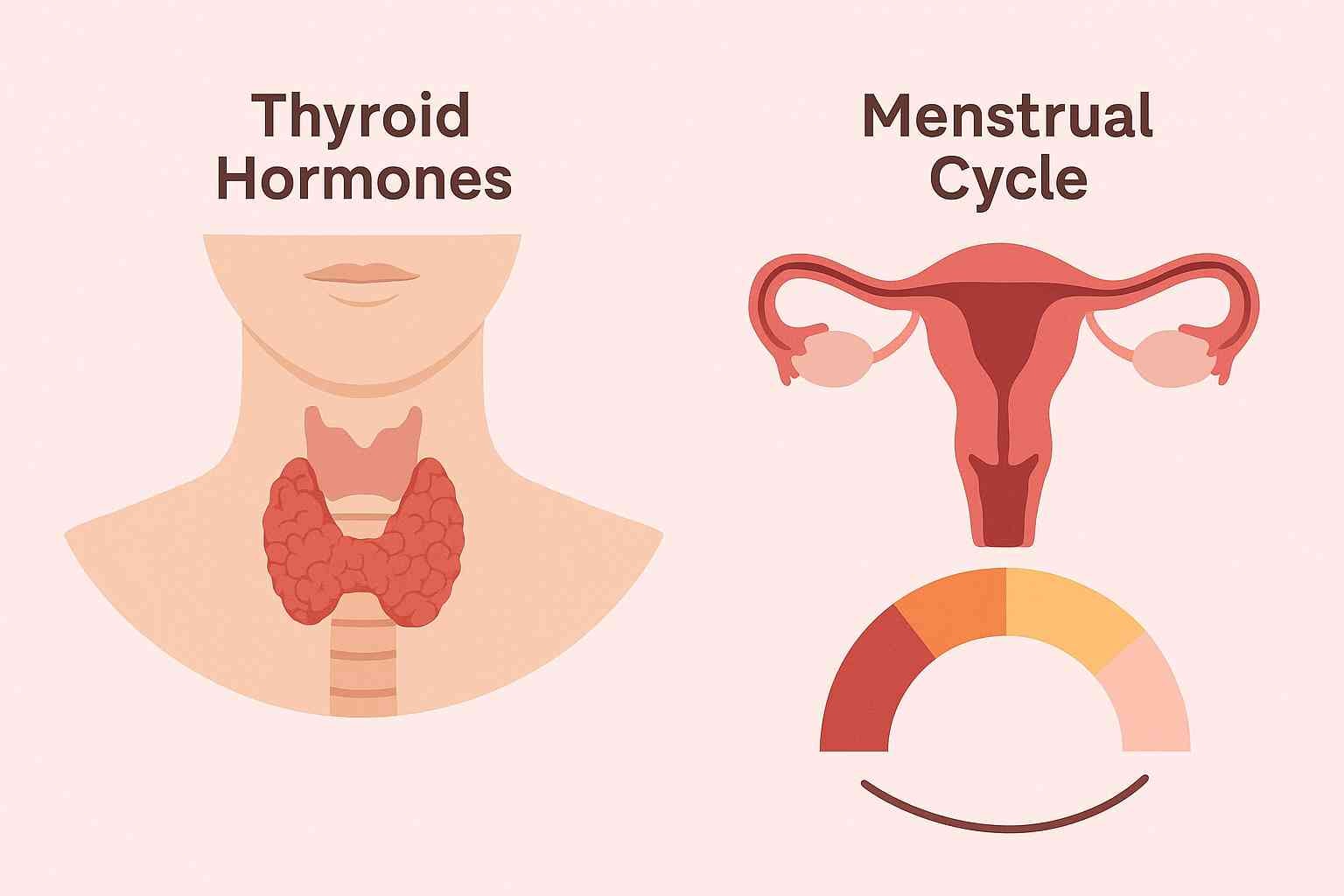
Thyroid hormones regulate vital body functions like metabolism, growth, and brain health. When thyroid hormone levels are off, your menstrual cycle can change. Tracking thyroid levels can also help predict ovulation more accurately.
Cycles may become longer, shorter, or even stop. This makes it harder for women with thyroid problems to track ovulation and get pregnant.
Doctors often recommend blood tests to check thyroid stimulating hormone (TSH) and other hormone levels. These tests show if your thyroid function is normal or if you need treatment.
How untreated hypothyroidism affect conception and pregnancy complications
When the thyroid is underactive thyroid (hypothyroidism), it does not make enough thyroid hormones. This can disturb ovulation and lower fertility.
For women who do conceive, untreated hypothyroidism during pregnancy increases the chance of miscarriage risk, low birth weight, or even birth defects in the baby.
What you can do:
- Get regular thyroid testing before and during pregnancy.
- Follow your doctor’s plan for thyroid hormone replacement if needed.
- Work with a healthcare provider to keep hormone levels balanced.
“Early treatment of hypothyroidism improves both fertility and pregnancy outcomes,” notes the American Thyroid Association.
How to Manage Thyroid Conditions During Pregnancy
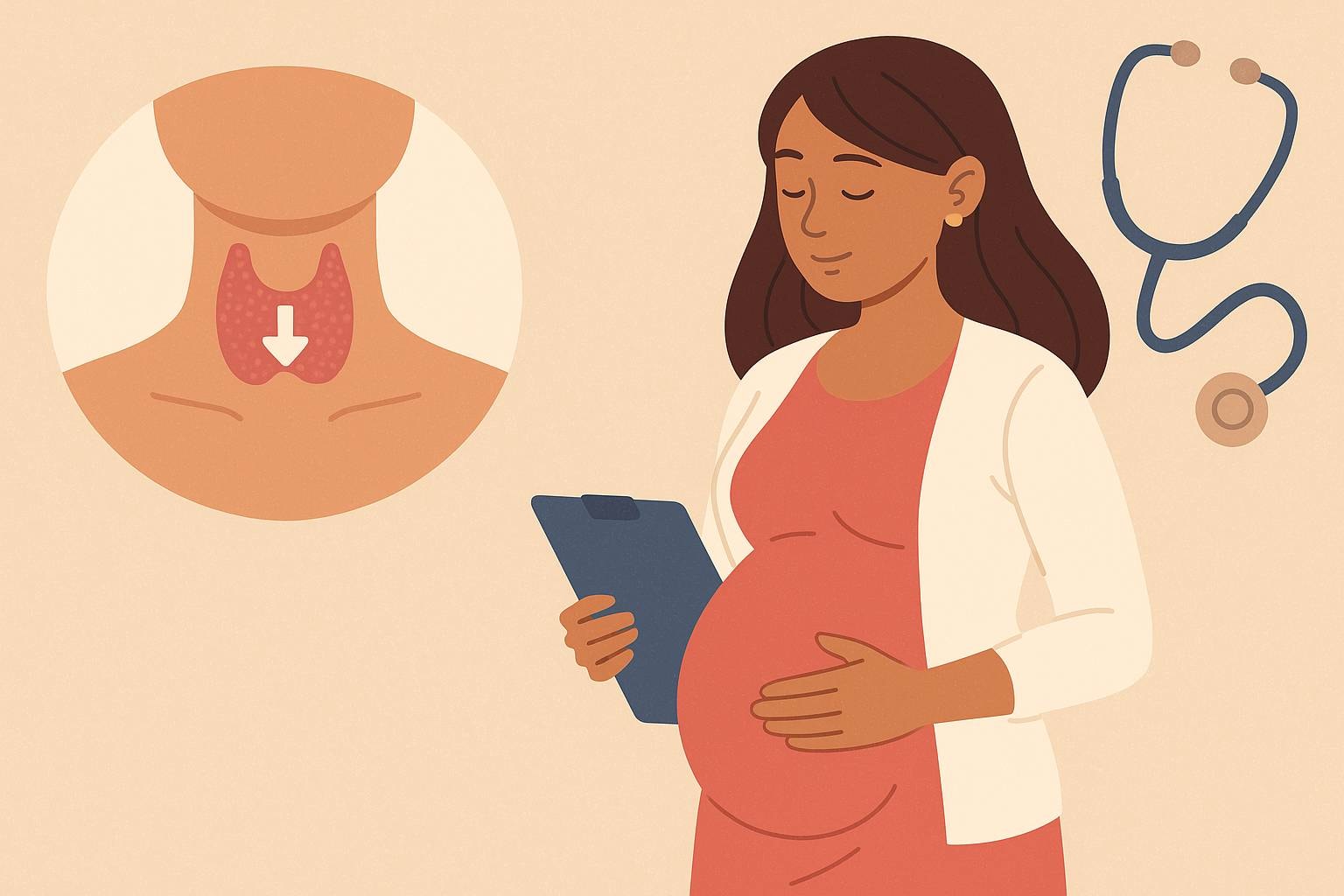
The thyroid gland makes hormones that help your baby grow, especially the brain and nervous system. Thyroid hormones play a key role in your baby’s brain development during pregnancy.
When thyroid hormone levels are too high or too low, risks like low birth weight, miscarriage risk, or birth defects increase.
But with the right steps, women with thyroid problems can still have a successful pregnancy and a healthy baby.
- Early Diagnosis is Key: Ask for blood tests early in pregnancy. Tests check thyroid stimulating hormone (TSH) and other hormone levels. Detecting thyroid disorders early helps doctors act fast.
- Thyroid Hormone Replacement: For underactive thyroid, doctors prescribe thyroid hormone replacement. This keeps hormone levels normal and supports a healthy pregnancy. Take the medicine every day as directed.
- Close Monitoring of Hormone Levels: Pregnancy changes your body and your thyroid function. Doctors check your thyroid hormone levels often. Adjustments in dosage may be needed to avoid too much thyroid hormone or too little.
- Specialist Care with Maternal-Fetal Medicine: High-risk pregnancies need extra care. A maternal fetal medicine specialist ensures both you and your baby stay safe. They track growth, watch for low birth weight, and adjust treatment plans.
- Avoiding Unsafe Treatments: Thyroid medicine, like radioactive iodine, are unsafe during pregnancy. Always ask your healthcare provider before taking new treatments. Safe options exist for both overactive thyroid and hypothyroidism.
- Managing Overactive Thyroid (Hyperthyroidism): An overactive thyroid can cause fast heartbeat and weight loss. Doctors use safe medicines to lower excess thyroid hormones. Careful monitoring avoids harm from much thyroid hormone.
- Healthy Diet and Prenatal Support: Eat a healthy diet rich in iodine, protein, and vegetables. Take prenatal vitamins recommended by your doctor. A balanced diet helps maintain thyroid health and supports your baby’s thyroid gland.
- Postpartum Care: After birth, some women develop postpartum thyroiditis. Watch for signs and symptoms like fatigue or mood swings. Continue follow-ups with your doctor to protect long-term thyroid health.
To support your health during pregnancy, learn more about thyroid tests, thyroid diseases, and available resources to stay informed and make the best choices for you and your baby.
Expert Support: Why Choose Fertility Specialist Dr. Anshu Agarwal for Thyroid and Pregnancy Care

Managing a thyroid condition while planning for pregnancy requires trusted medical guidance. Dr. Anshu Agarwal, a leading gynecologist in Ranchi with over 18 years of experience, specializes in high-risk obstetrics, infertility treatments, and personalized women’s healthcare.
- Proven Expertise: She has helped over 300 patients achieve successful pregnancies—even without IVF.
- Holistic Care: From routine checkups to managing thyroid disorders during pregnancy, her approach ensures both mother and baby’s safety.
- Advanced Treatments: Skilled in laparoscopic surgeries and complex overall fertility solutions, she provides options tailored to each woman’s condition.
- Trusted by Patients: Known for compassionate care, Dr. Agarwal has guided countless women toward safe motherhood despite thyroid and reproductive challenges.
📍 Clinic Location: Devi Maa Women’s Hospital, Bariatu Road, Ranchi – 834009, Jharkhand, India
📞 Phone: 072939 37999
🌐 Website: www.dranshuagarwal.com
If you’re wondering “can thyroid patient get pregnant and still have a healthy baby?”—Dr. Anshu Agarwal’s expertise in medical treatment offers the reassurance and results many families seek.
Special Conditions: Hashimoto’s Disease, Graves’ Disease, and Thyroid Cancer
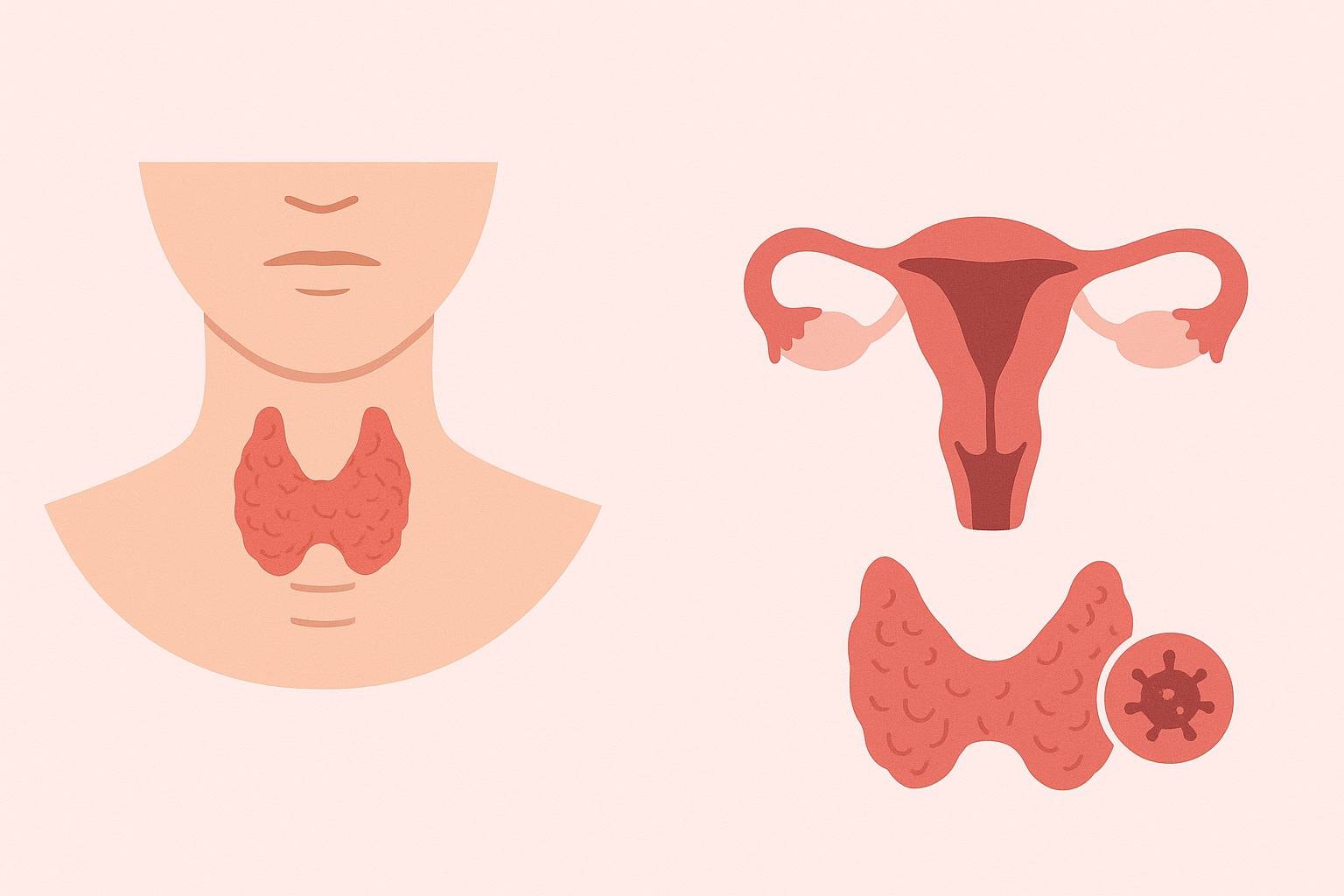
1. Hashimoto’s Disease
- Hashimoto’s is an autoimmune disease where the immune system mistakenly attacks the thyroid gland.
- It often causes underactive thyroid, leading to fatigue, weight gain, and irregular periods.
- Women with Hashimoto’s may need thyroid hormone replacement during pregnancy.
- Regular blood tests help keep thyroid hormone levels stable for a successful pregnancy.
- Thyroid hormone replacement generally has fewer side effects compared to other treatment options.
2. Graves’ Disease
- Graves’ is another autoimmune disorder but it causes an overactive thyroid.
- High hormone levels can increase miscarriage risk and sometimes affect the baby’s thyroid.
- Doctors may prescribe safe medicines to control too much thyroid hormone, and some medications have fewer complications than others.
- Close monitoring by maternal fetal medicine specialists is important.
3. Thyroid Cancer
- Some women face pregnancy after thyroid cancer treatment.
- Surgery before pregnancy is common, but radioactive iodine therapy is avoided until after delivery because it carries more risks, while surgery alone often results in fewer complications.
- With careful follow-up and normal thyroid function, many women still achieve a healthy pregnancy.
Advanced Treatments for Thyroid Disease
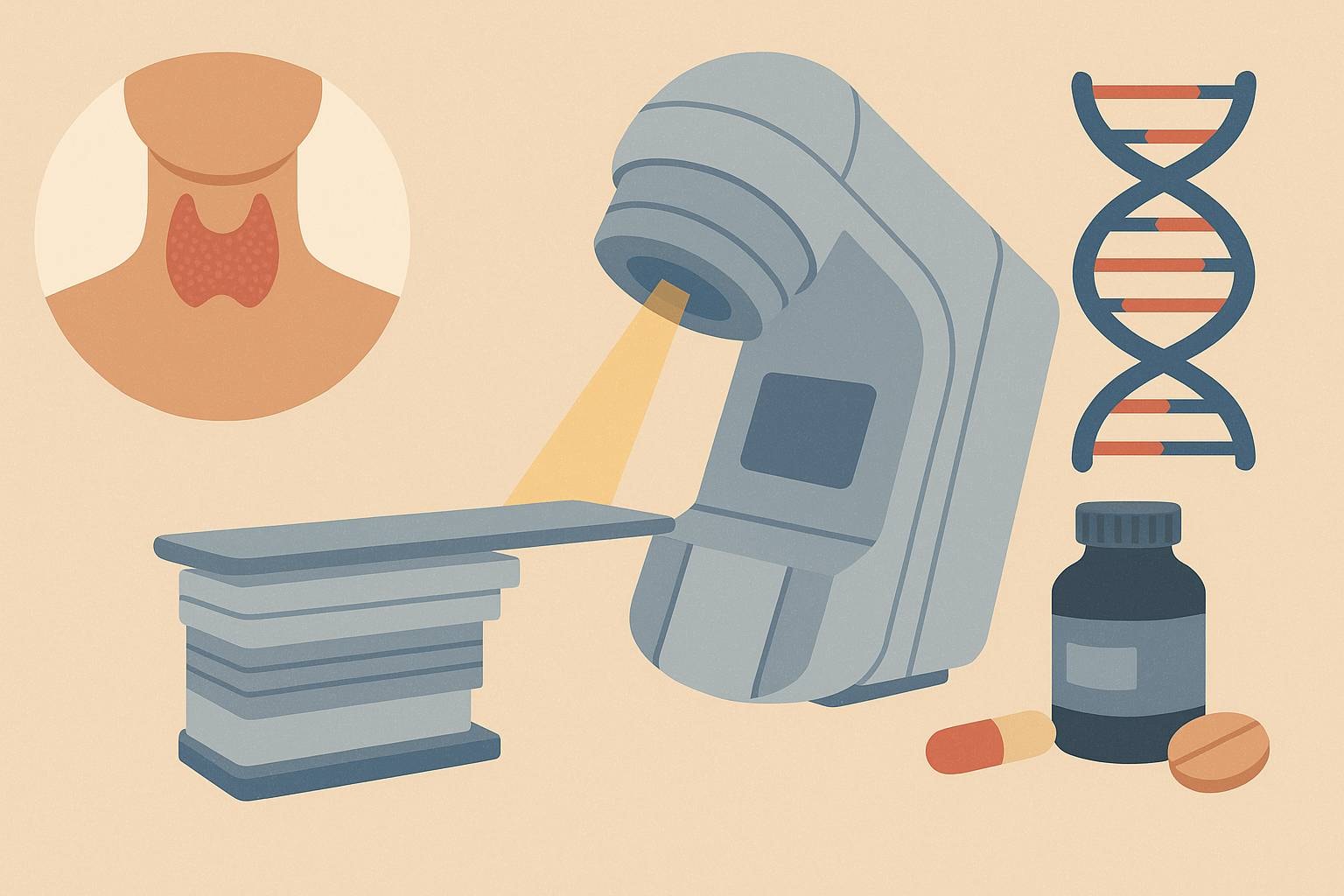
1. Thyroid Surgery Before Pregnancy
What it is:
- Surgery removes part or all of the thyroid gland.
- It is often suggested if there is a thyroid nodule or thyroid cancer.
How it helps:
- Surgery before pregnancy allows normal thyroid function to be restored with medicine.
- Women can still achieve a healthy pregnancy after recovery.
- Regular blood tests track thyroid hormone levels to keep them safe for mother and baby.
2. Radioactive Iodine Treatment (Not During Pregnancy)
What it is:
- Radioactive iodine is used to shrink or destroy overactive thyroid cells.
- Radiation treatment, such as radioactive iodine, should be avoided during pregnancy because it can harm the baby. It is not safe for pregnant women or those planning pregnancy soon.
- In rare cases, doctors may recommend potassium iodide to block harmful radiation from affecting the thyroid gland.
How it helps:
- Done before pregnancy, it lowers risks from overactive thyroid and untreated hyperthyroidism.
- After treatment, doctors guide women on when it’s safe to try conceiving.
- This step reduces the chance of risk of miscarriage caused by unstable hormone levels.
3. Medication Adjustments for Pregnancy
What it is:
- Women often need changes in their medicines during pregnancy.
- This includes adjusting thyroid hormone replacement to maintain balance.
How it helps:
- Prevents too little or too much thyroid hormone, both of which can harm the baby.
- Protects against low birth weight and supports healthy brain and nervous system development.
- According to the American Thyroid Association, close follow-up during pregnancy improves outcomes and ensures a successful pregnancy.
4. Personalized Treatment Plans
What it is:
- Doctors design care around the type of thyroid disease, such as thyroid dysfunction, subclinical hypothyroidism, or thyroid autoimmunity.
- Plans may combine surgery, medicine, or lifestyle changes.
- Specialists also track related risks like high blood pressure or other digestive and kidney diseases.
How it helps:
- A tailored plan lowers the risk of thyroid problems affect pregnancy.
- It gives better control over hormone balance and supports pregnant women safely.
- As the American Thyroid Association recommends, individual care leads to stronger outcomes and healthier babies.
5. Post-Treatment Fertility Outlook
- After surgery or medicine, doctors review fertility chances.
- They run blood tests to check hormone recovery and ensure no excess or shortage.
- Women with past thyroid problems still have good chances of a successful pregnancy with close monitoring.
How it helps:
- Treatment reduces miscarriage risk and supports natural conception.
- It builds confidence for women with thyroid disease who want a healthy pregnancy.
- With guidance from a skilled healthcare provider, most women can move forward toward a safe delivery.
What is Postpartum Thyroiditis, and How Common is it?
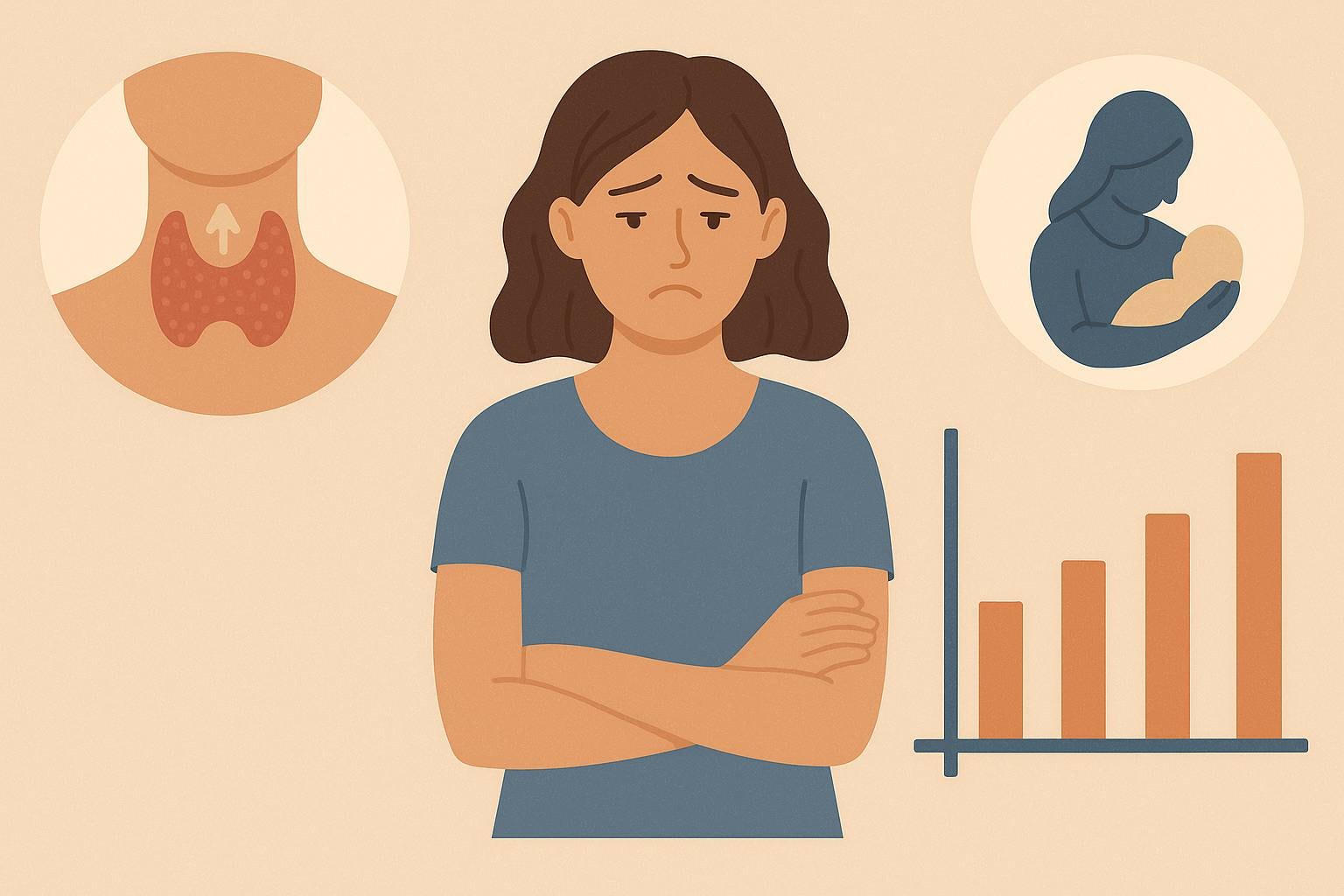
Postpartum thyroiditis is a condition that happens in some women after giving birth. It occurs when the immune system mistakenly attacks the thyroid gland.
If you need to take thyroid medications, it is important to evaluate whether it is safe to breastfeed while on these medications. Guidelines are available to help determine appropriate medication dosage and safety considerations during breastfeeding.
The condition may cause too little or too much thyroid hormone in the body. Many women ask, “can thyroid patient get pregnant again after such problems?” The answer is yes, but close medical care is important.
How postpartum thyroiditis affects baby’s thyroid gland and long-term thyroid health
- Postpartum thyroiditis usually affects the mother, not the baby.
- In rare cases, the mother’s thyroid changes can influence the baby’s thyroid gland during pregnancy.
- If not treated, it may affect long-term thyroid health for both mother and child.
How it helps to know:
- Early blood tests and monitoring lower risks.
- Tracking hormone levels ensures a healthy baby and supports a successful pregnancy in the future.
- Experts from the American Thyroid Association say regular follow-ups are key to preventing complications.
Signs and Symptoms of hyperthyroidism after delivery
Take a look at the below early signs and symptoms to manage hyperthyroidism effectively:
What to look for:
- Fast heartbeat and weight loss.
- Feeling very tired or anxious.
- Trouble sleeping or shaky hands.
- Hair loss and mood changes.
Why it matters:
- These are common signs and symptoms of hyperthyroidism after delivery.
- Ignoring them may lead to serious thyroid problems and increase miscarriage risk in later pregnancies.
- Talking to your healthcare provider early makes recovery faster and protects your thyroid health.
Healthy Lifestyle for a Successful Pregnancy with Thyroid Problems
- Follow a Balanced, Healthy Diet: Eat fresh vegetables, fruits, lean proteins, and whole grains. Avoid too much processed food and sugar. A healthy diet helps keep thyroid hormone levels in balance and reduces thyroid dysfunction
- Take Prenatal Vitamins as Prescribed: Prenatal vitamins provide key nutrients like folic acid and iron. They protect against birth defects and support the baby’s growth. Doctors recommend you never skip them if you have thyroid disease.
- Stay Consistent with Thyroid Medication: Take your medicines at the same time daily. This ensures your body has enough thyroid hormones. Stopping suddenly can raise miscarriage risk and harm your thyroid health.
- Regular Blood Tests and Check-Ups: Blood tests track your thyroid function and adjust doses when needed. Frequent check-ups with your healthcare provider help avoid problems. The American Thyroid Association recommends regular monitoring during pregnancy.
- Manage Stress and Sleep: Poor sleep or chronic stress can worsen thyroid problems. Practice yoga, breathing exercises, or short walks. Good rest supports both mother and baby.
- Avoid Unsafe Treatments: Do not use radioactive iodine treatment during pregnancy. Stay away from unverified herbal cures or unsafe supplements. Only follow plans approved by your doctor.
- Control Other Health Risks: Watch out for high blood pressure, diabetes, and weight gain. These can affect both the mother and the baby’s thyroid gland. Managing them lowers risks of low birth weight and other issues.
Conclusion
So, can thyroid patient get pregnant and still have a healthy baby? Yes. With the right care, most women with thyroid issues can achieve a successful pregnancy. Regular check-ups, proper diagnosis, and support from a healthcare provider reduce the risk of miscarriage and birth problems.
In some cases, doctors may also test for TSH receptor antibodies to guide treatment, ensuring proper medical care. Remember—thyroid problems are common but manageable. Stay informed, follow your doctor’s advice, and you can successfully conceive. Have a safe journey into motherhood.

.jpg)
.jpg)

.jpg)


